Group Counseling: Basics
- Group Counseling: a method of therapy implying counseling a group of people.
- Rationale: necessity to encourage multicultural and interpersonal communication.
- Task groups: managing a task.
- Psychoeducational groups: encouraging self-education.
- Counseling: psychological assistance.
- Psychotherapy: resolving a complex psychological issue.
- Brief groups: fast resolution of a current concern.
The significance of group counseling is becoming increasingly high in the modern globalized environment. Due to the necessity to function within a society and engage in interpersonal and often multicultural interactions, people need to learn to address complex issues in a group. There are different types of groups, including task, psychoeducational, counseling, psychotherapy, and brief ones. A task group is focused on managing a particular assignment. Psychoeducational groups help participants learn new information and develop specific skills. Counseling groups help address psychological issues without causing massive changes to one’s personality. Psychotherapy groups, in turn, allow focusing on a certain psychological concern. Finally, brief groups require managing a particular issue within a restricted amount of time (Jacobs, Schimmel, Masson, & Harvill, 2015).
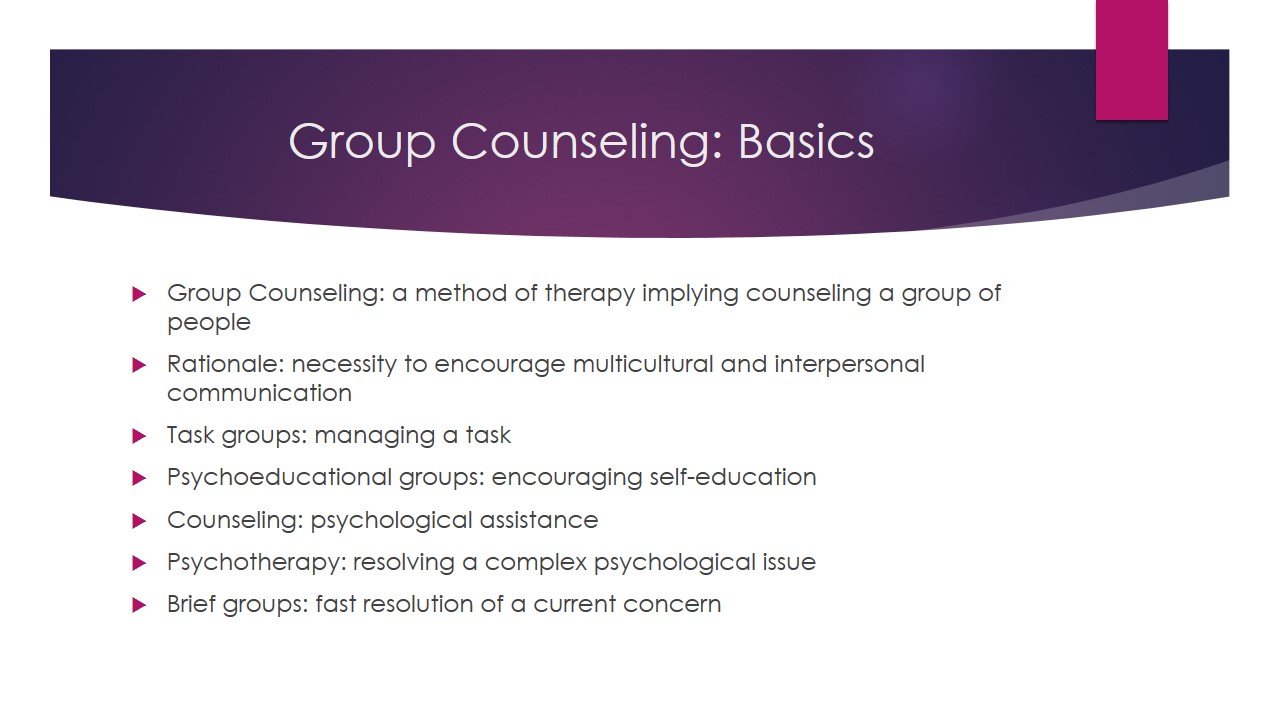
Group Counseling: Task Groups and Brief Groups
- Task Groups:
- Focused on a particular assignment;
- Deployed in a workplace setting;
- Require collaboration between participants.
- Brief Groups:
- Are time-bound;
- Address a single concern;
- Explore a wider range of topics.
Task groups and brief groups have a lot in common in terms of how problems are managed within them. Therefore, the choice of a specific strategy hinges on rather intricate details concerning the group that needs counseling and especially its members. For instance, both groups are focused on addressing a particular assignment, yet task groups are not bound by time constraints as opposed to brief groups.
Furthermore, addressing work-related issues is the primary goal of task groups. As a rule, the agenda of task groups does not go any further. Brief groups, in turn, can be devoted to any subject as long as they are kept short and concise. Thus, a wider range of issues is embraced, yet the participants only have the opportunity to develop a rather superficial solution to them.
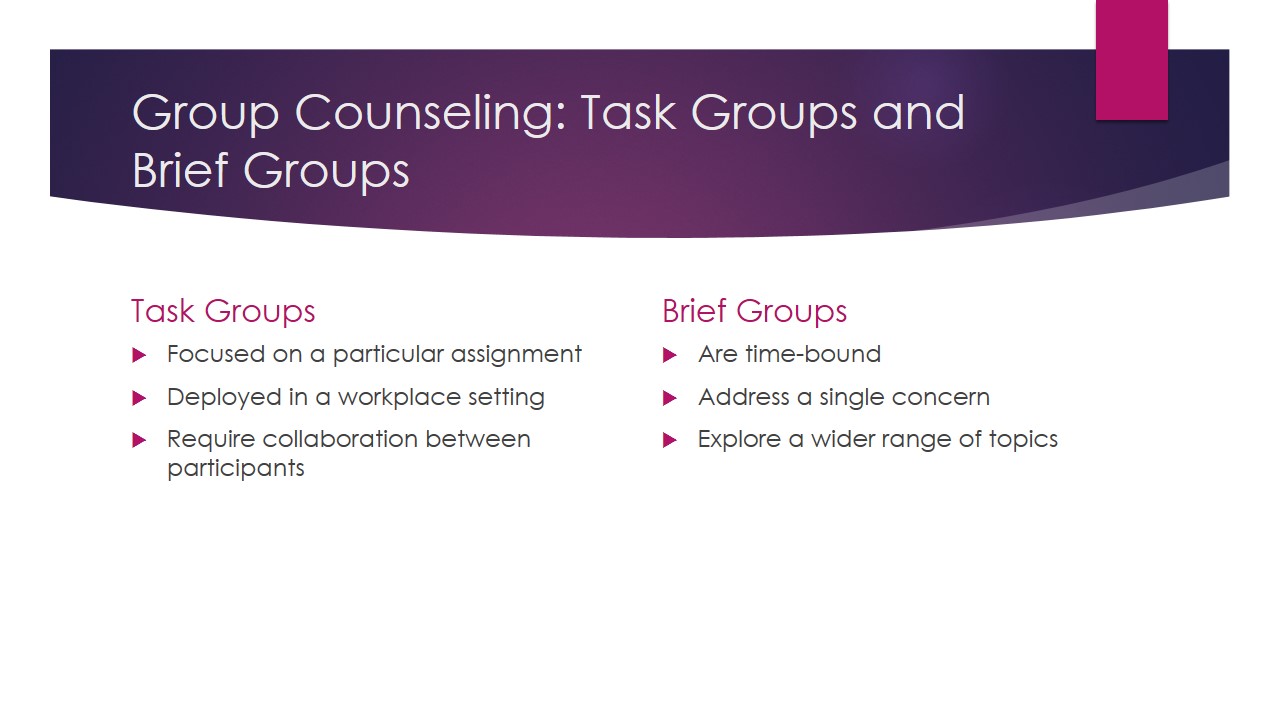
Group Counseling: Psychoeducational Groups, Psychotherapy Groups, and Counseling Groups
- Psychoeducational Groups: focus on promotion of psychological knowledge and communication skills;
- Psychotherapy Groups: solution of psychological issues and provision of assistance;
- Counseling Groups: management of current issues without an in-depth analysis of personal problems (Corey, 2015).
In the existing taxonomy, there is a set of groups that are supposed to explore psychological issues rather than task-related ones. Thus, the focus is on internal concerns rather than on external ones in the specified scenario. The identified groups can be utilized when handling a personal or cross-cultural conflict or a mental health concern. In psychoeducational groups, one can receive extensive information about the nature of particular psychological issues and confrontations within a team, as the name suggests. Psychotherapy groups, in turn, focus on the active support of people with mental health issues or conditions. They allow improving cognition processes and give people the ability to process information properly. Finally, counseling groups are supposed to manage current problems without delving too deep in the mental condition of an individual (Corey, 2015). Therefore, counseling groups can be used in an academic or workplace context, whereas psychoeducational and psychotherapy groups should be deployed in a healthcare environment where appropriate services are provided to people with mental health conditions.
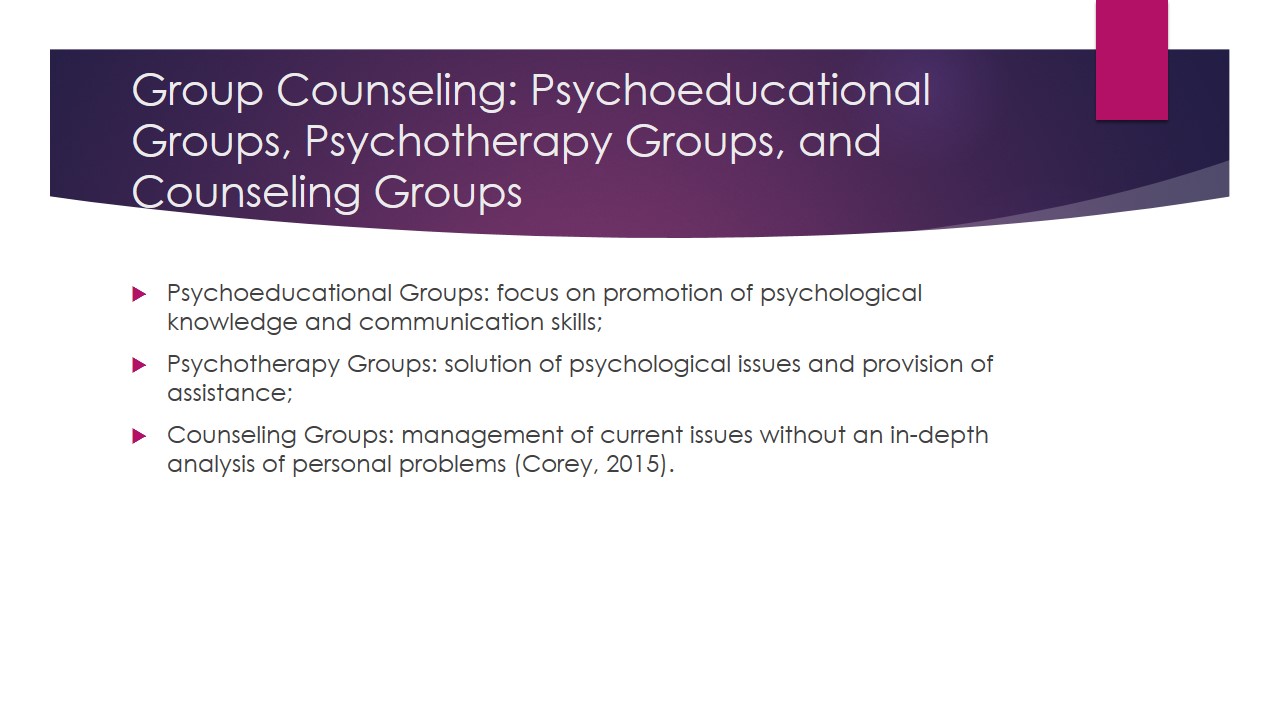
Irwin Yalom’s Factors Promoting Change
- Instillation of hope.
- Universality.
- Imparting information.
- Altrusim.
- Corrective recapitulation.
- Socializing techniques.
- Focus on imitative behavior.
- Interpersonal learning.
- Group cohesiveness.
- Catharsis.
- Existential factors (Lassiter & Culbreth, 2017).
It should be borne in mind that an array of factors may have a direct effect on the counseling process and the outcomes thereof. The specified phenomenon is especially noticeable in group counseling, where the array of factors influencing its development is extraordinarily vast. Among the essential elements that may change the course of the counseling process, cultural issues need to be mentioned first. In addition, personal psychological issues experienced by specific group members may become an obstacle. Traditionally, Yalom’s eleven psychological factors are identified when considering the issues that may define the course of the therapy. These include the focus on socializing and the promotion of empathy as the keys to successful communication and conflict management (Lassiter & Culbreth, 2017).
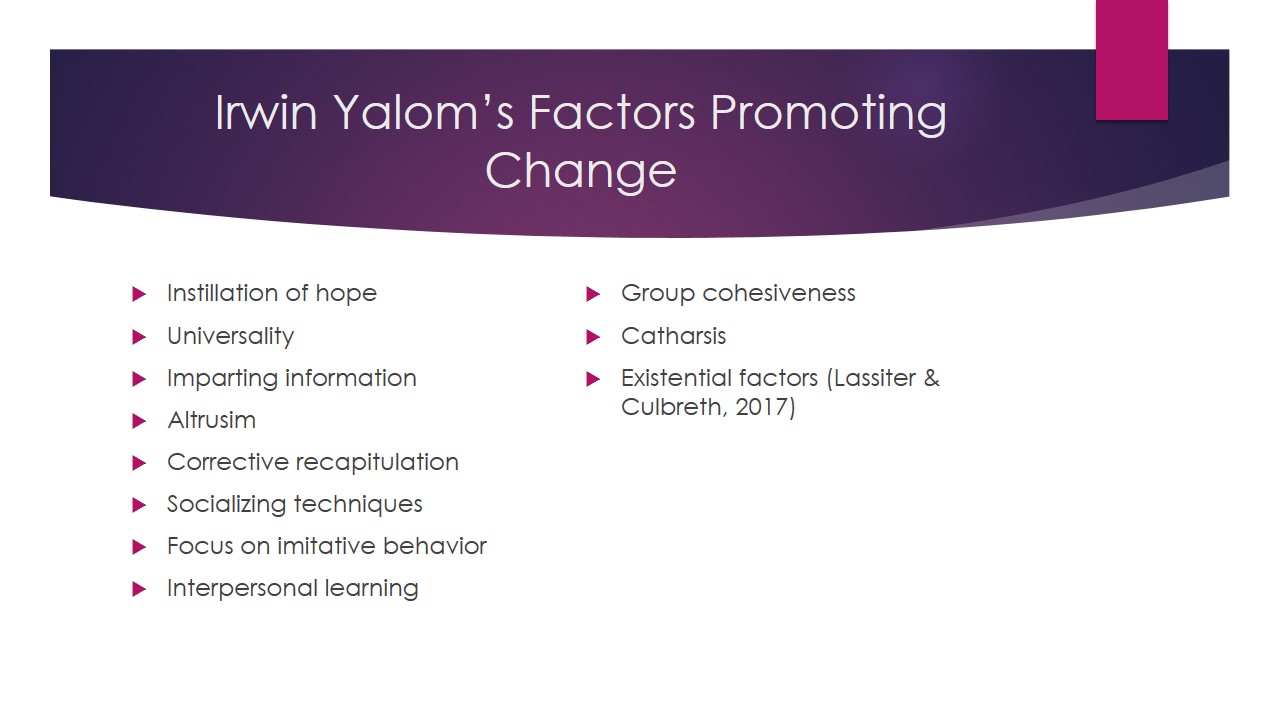
Group Counseling: Strategies and Expected Outcomes
- Cognitive Behavior Theory: understanding behavioral standards and norms;
- Rational Emotive Behavior Therapy: addressing emotional aspects of one’s behavior;
- Reality Therapy: developing an understanding of ethical factors defining people’s choices;
- Adlerian therapy: assessment of extrinsic factors;
- Transactional analysis: ego state evaluation.
At present, several approaches to group counseling exist. Particularly, the issue can be viewed from the perspective of several theoretical frameworks. The Cognitive Behavior Theory sheds light on how people’s attitudes and behavioral norms are shaped. Rational Emotive Behavior Therapy helps to approach the problem from the perspective of people’s emotions, whereas Reality Therapy implies appealing to people’s sense of ethics and morality (Corey, 2015). The Adlerian therapy, in turn, provides a chance to explore the external factors leading to changes in an individual’s mental condition and behavior (Sharf, 2015). The transactional analysis offers an opportunity to locate an individual’s ego state, which, in turn, informs the further choice of a therapeutic approach.
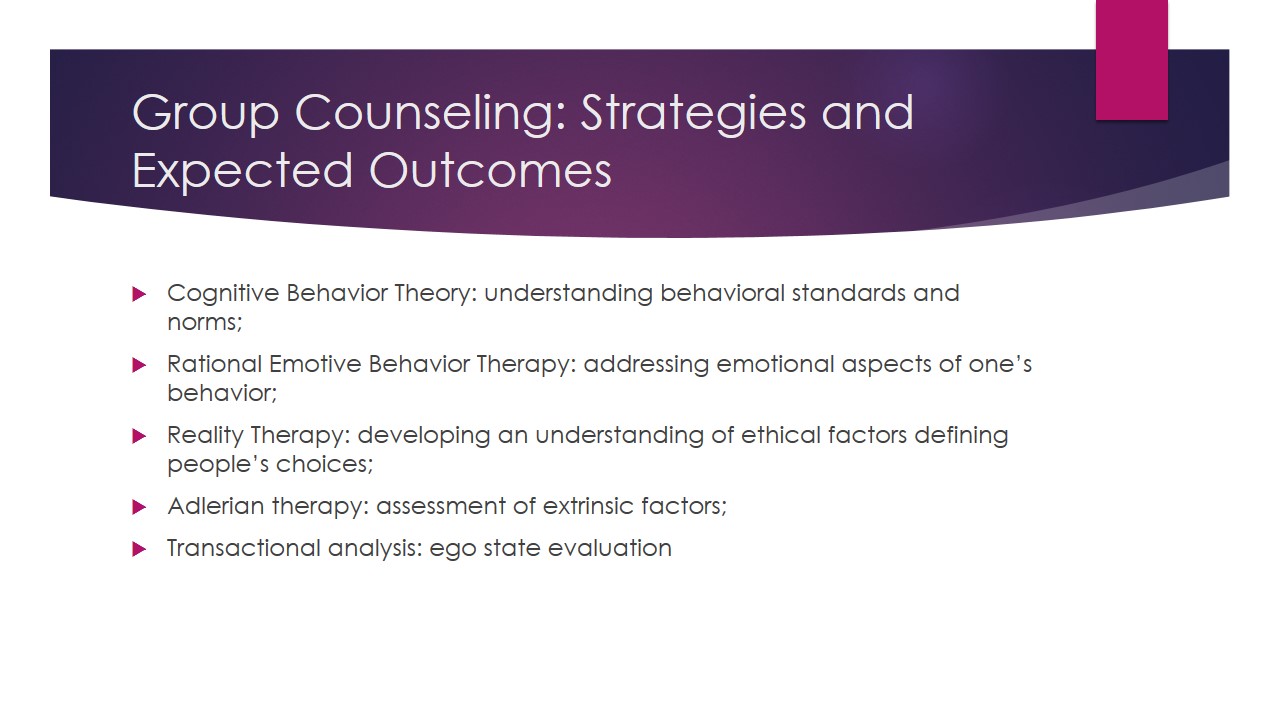
Counseling Issues in a Multicultural Environment
- Asian American background: a better understanding of Asian American learners’ needs;
- Opportunity to reinforce family support;
- Tools for building a dialogue with students’ parents;
- Improved counseling services due to a better understanding of students’ needs.
As a person of the Asian American descent, I must admit that counseling requires culture-specific adjustments to produce a tangible effect. Particularly, the personal cultural background helps me understand the needs of Asian American students as well as White American learners. As a result, I can provide the counseling services of a higher quality. Specifically, I am aware of the significance that family plays in the lives of Asian Americans. As a result, I can use my knowledge to encourage the formation of a stronger bond between a learner and their family members. Consequently, a large number of issues that hinder the learning process are addressed successfully, and a student can receive family support. Similarly, the impact of traditions on learners’ motivation and ability to perform certain tasks is taken into account when addressing a particular concern.
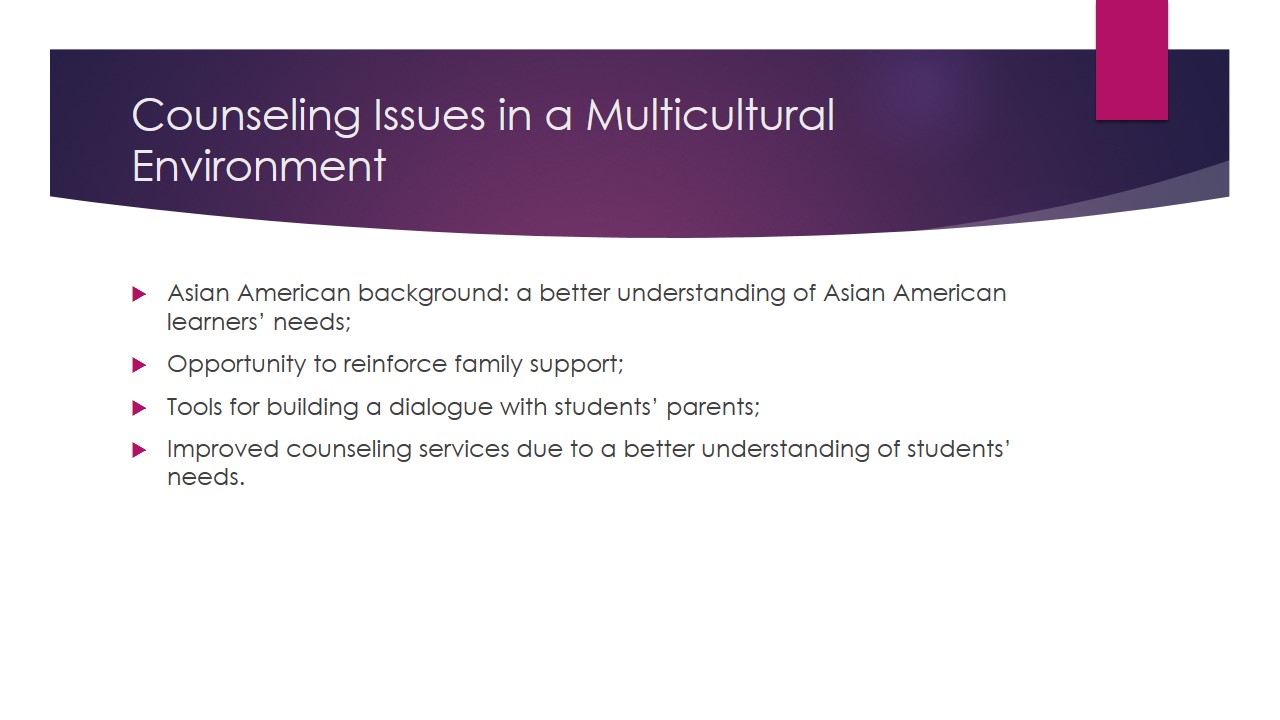
Counseling Issues in a Multicultural Environment: Concerns
- Lack of understanding of the needs of other cultures;
- Need for acquiring skills for multicultural communication;
- Lack of awareness about students with special needs;
- Necessity to pay more attention to learners from different socioeconomic backgrounds.
However, my cultural background may also become a stumbling block on the way to meeting learners’ needs. Specifically, it is difficult to approach students from other cultures, such as African American, Latin, or Native American ones. Therefore, a greater emphasis must be placed on cross-cultural communication. I must learn more about the needs of students from culturally diverse backgrounds to ensure that they are provided with the counseling services of the finest quality. For instance, a deeper insight into the needs of learners with disabilities, students from other ethnic backgrounds, and people of a different socioeconomic status is required.
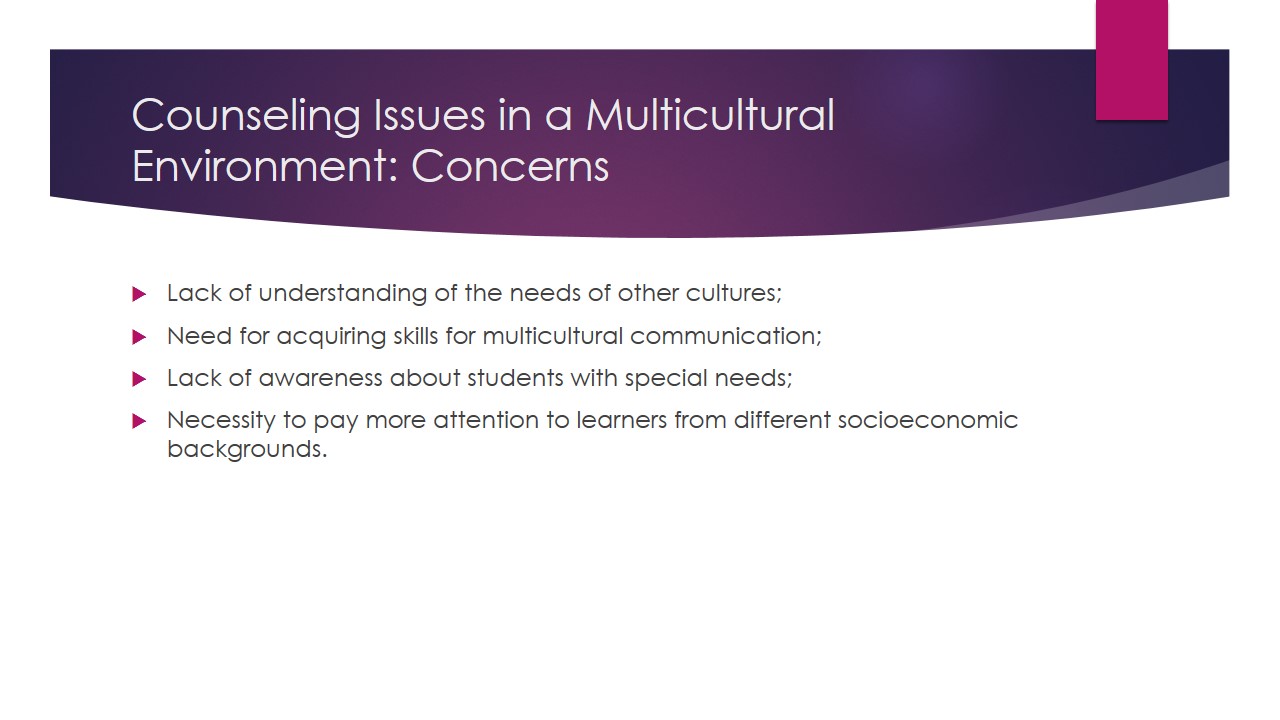
Counseling Issues in a Multicultural Environment: Suggestions
- Focus on the consistent learning;
- Acquisition of crucial cross-cultural communication skills;
- Active use of emotional intelligence during communication;
- Careful use of nonverbal communication elements;
- Viewing cooperation and collaboration as priorities.
Attempting to learn about every possible culture and the needs of its representatives is barely a possibility. Therefore, it is necessary to approach each problem on a case-by-case basis and use the principles of empathy, emotional intelligence, and cooperation. It is crucial to be culturally sensitive and be ready to provide students with emotional support.
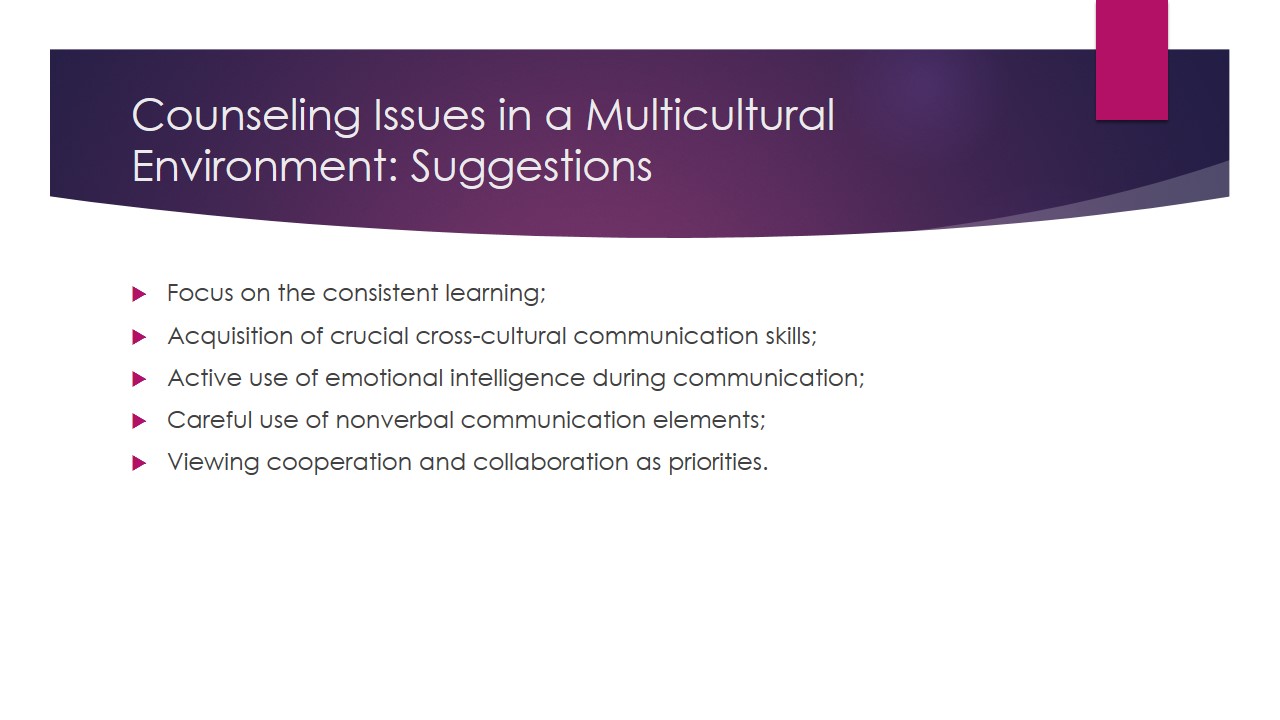
Personal Characteristics as Support in Counseling
- Emotional responsiveness;
- Emotional intelligence;
- Empathy and compassion;
- Ability to relate to students’ problems;
- Listening skills and attentiveness to others’ problems.
Using personal character traits as the means of improving the communication process and assisting students in coping with their issues should be seen as a priority. Among my personal characteristics that I deem as important for a counselor, I must mention compassion and empathy. It is crucial to show a student that their personal problems are understood and accepted; otherwise, the counseling process will have no effect (Viers, 2017). Therefore, I must use my ability to relate to students’ concerns on an emotional level and empathize with the difficulties that they are facing. As a result, a deep bond will be created, and students will be eager to share their concerns with me. Thus, I will be capable of providing them with professional assistance.
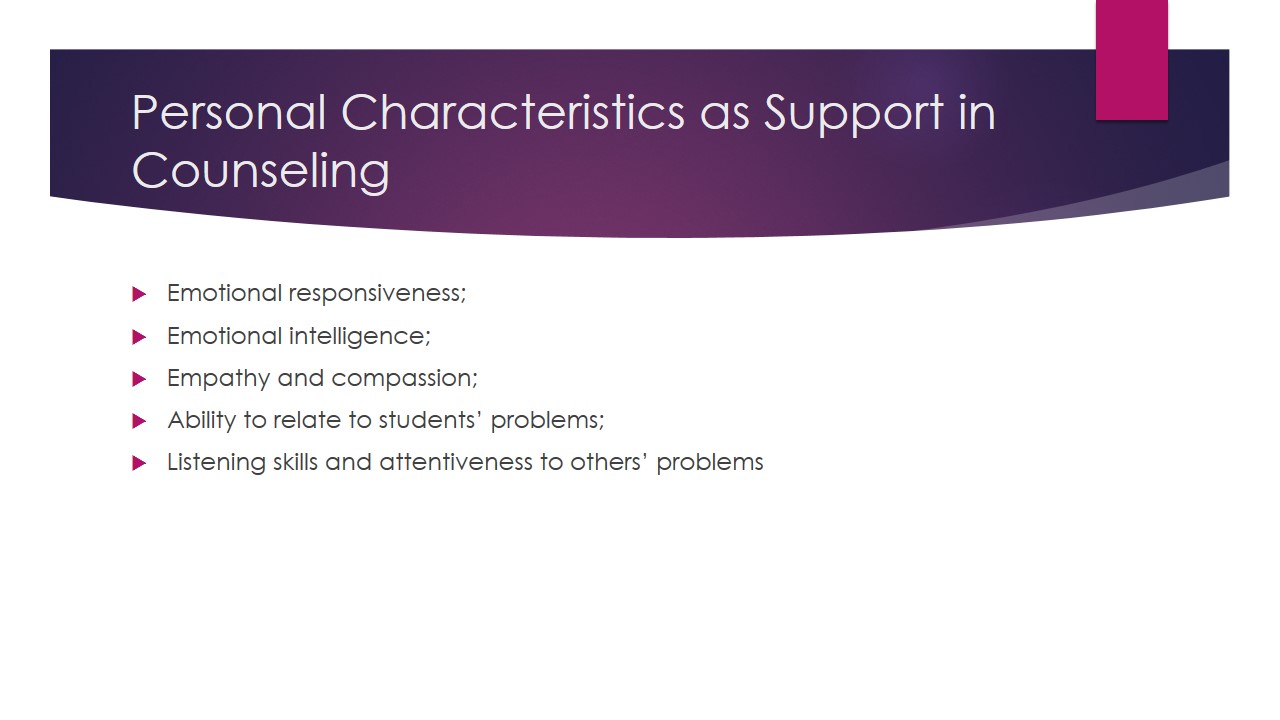
Nonverbal Communication Skills
- Using active listening;
- Maintaining eye contact;
- Giving students enough personal space;
- Using appropriate facial expressions.
The importance of nonverbal communication is often dismissed, yet the identified component of a conversation must not be underrated. By using nonverbal communication skills, a counselor will be able to build a rapport with students.
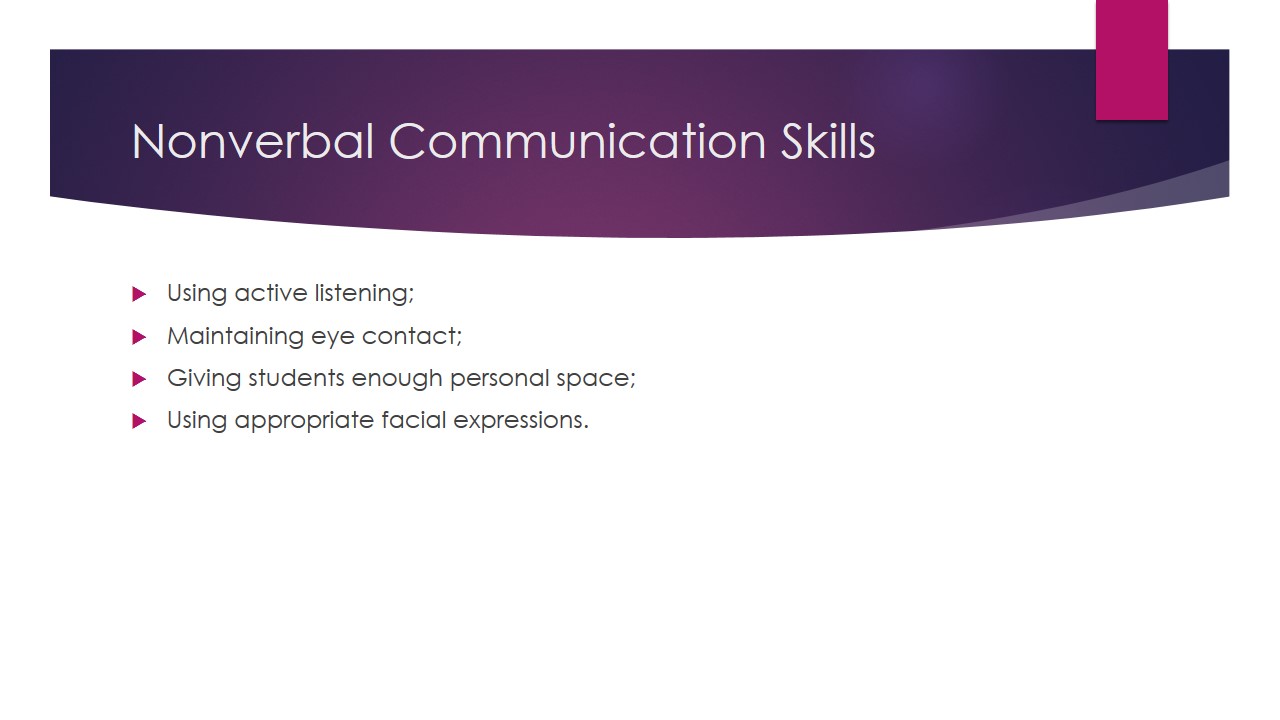
Leadership Skills
- Transformational leadership: changing students’ attitude:
- Altering students’ behavior by using a role model;
- Encouraging independence and self-reliance;
- Providing support and offering guidance;
- Using positive reinforcement and encouragement.
Finally, the use of leadership skills needs to be mentioned as an important asset that I can use to improve the quality of counseling and encourage students to manage their problems successfully. While the ability to listen is crucial for a counselor, it is also important to prompt a learner to act independently and learn to solve problems, as well as approach issues responsibly. For this purpose, the use of the transformational Leadership Model is essential. I tend to focus on motivating learners and transforming their attitude toward specific issues to help them succeed.
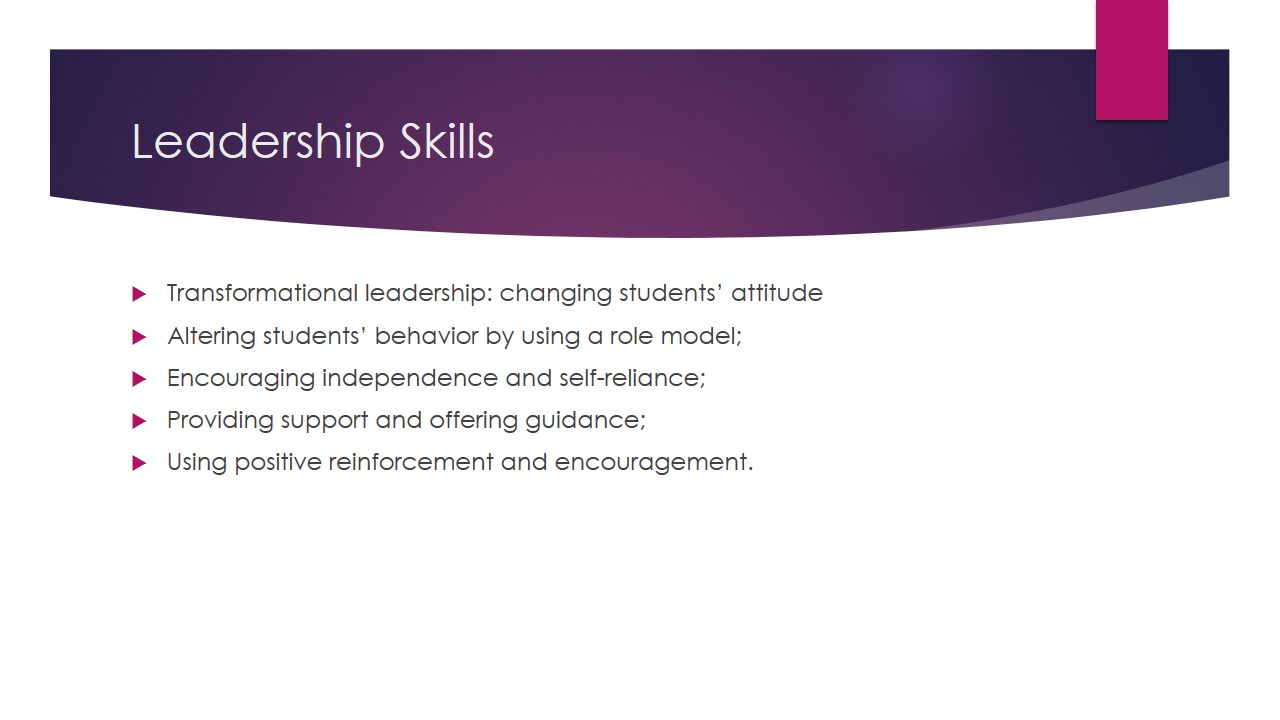
Humor and Positive Thinking
- Humor:
- Creating a relaxing environment;
- Helping a student not to overestimate the problem;
- Relieving a student of the stress that they have been experiencing.
- Positive Thinking:
- Seeing a problem as manageable;
- Seeking an appropriate solution;
- Being positive about the available options.
Humor can be used to help students see their problems as solvable. When being able to laugh at their problems, people no longer view them as devastating and life-destroying. Therefore, it will be necessary to help learners see the issues that they face through the lens of humor. When using the specified quality as the means of helping learners to approach their problems critically and realize that they are solvable, one will be able to encourage them to develop viable solutions.
Positive thinking is the skill that is linked directly to humor. As soon as the scale of the concern is reduced with the help of humor, the use of critical analysis is required to develop a solution. A counselor can give a student an example of how critical thinking can be applied in the context of a particular dilemma. As a result, a learner will be capable of managing the issue independently.
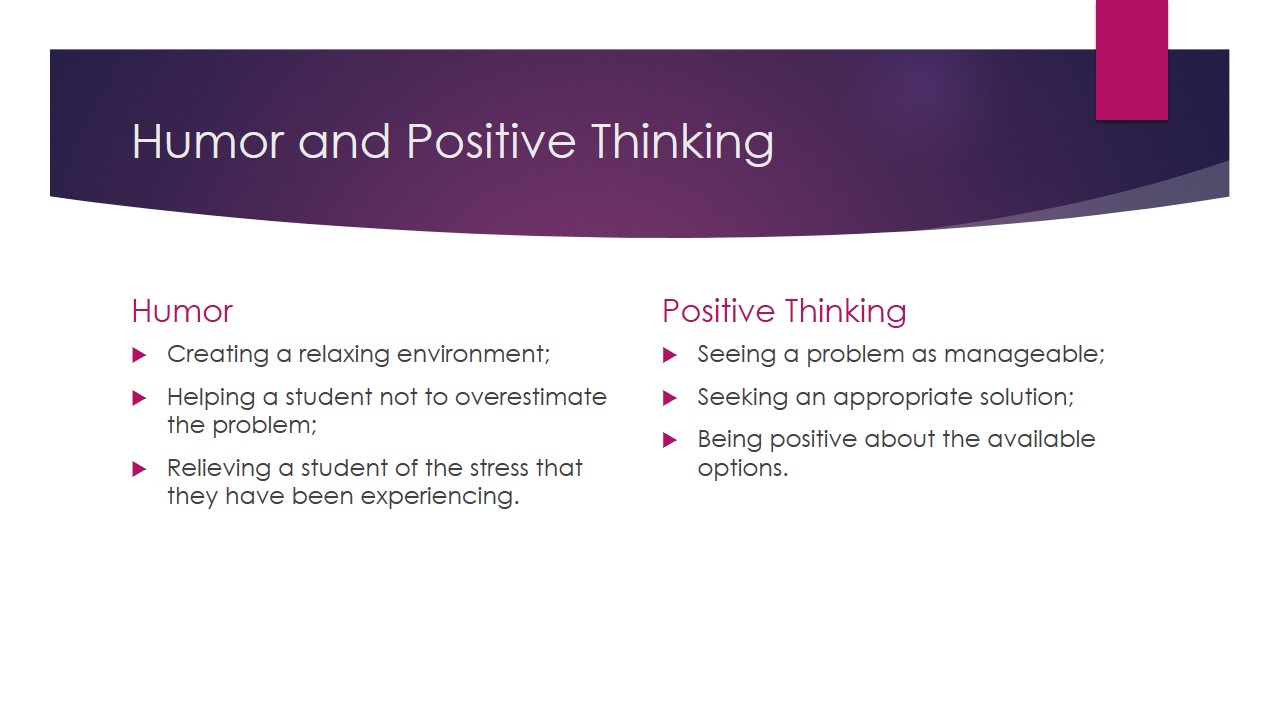
Group Leadership Skills: Transformation
- Changing behaviors to socially acceptable ones;
- Altering attitudes to more positive ones;
- Promoting personal growth;
- Enhancing interpersonal communication;
- Prompting cross-cultural dialogue;
- Stressing the importance of negotiation.
The ability to transform students’ attitude should be seen as one of the crucial aspects of counseling. Transformation of students implies changing their attitude toward a particular issue and helping them become better people. Particularly, acquiring new communication skills, overcoming prejudices, and solving conflicts constructively should be seen as the abilities that a counselor must help students develop.
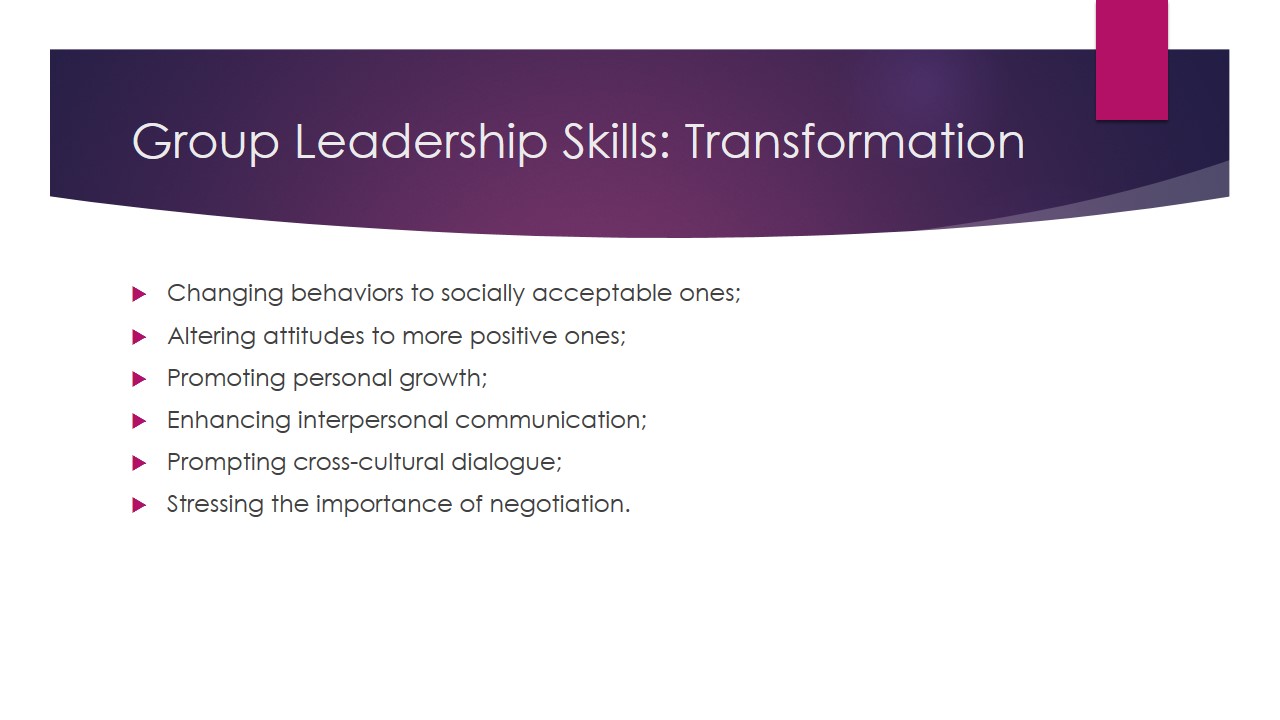
Group Leadership Skills: Building Trust
- Creating an open environment;
- Promoting sincerity and trust;
- Appreciating students’ confidentiality;
- Determining trust patterns among target audiences;
- Keeping information secure and preventing its disclosure.
The ability to build relationships based on trust is another leadership quality that will help me provide high-quality counseling services to students. Trust is especially important in group counseling sessions, where several students need to address a common issue that affects their team. Therefore, my ability to establish trust-based relationships is bound to have a profound effect on the overall quality of counseling services and the outcomes thereof. Without trust lying at the foundation of counselor-student relationships, learners will not be able to share the information that may lie at the root of their problems. Therefore, the specified ability is bound to become the essential group leadership skill that will improve counseling and help students manage their issues.
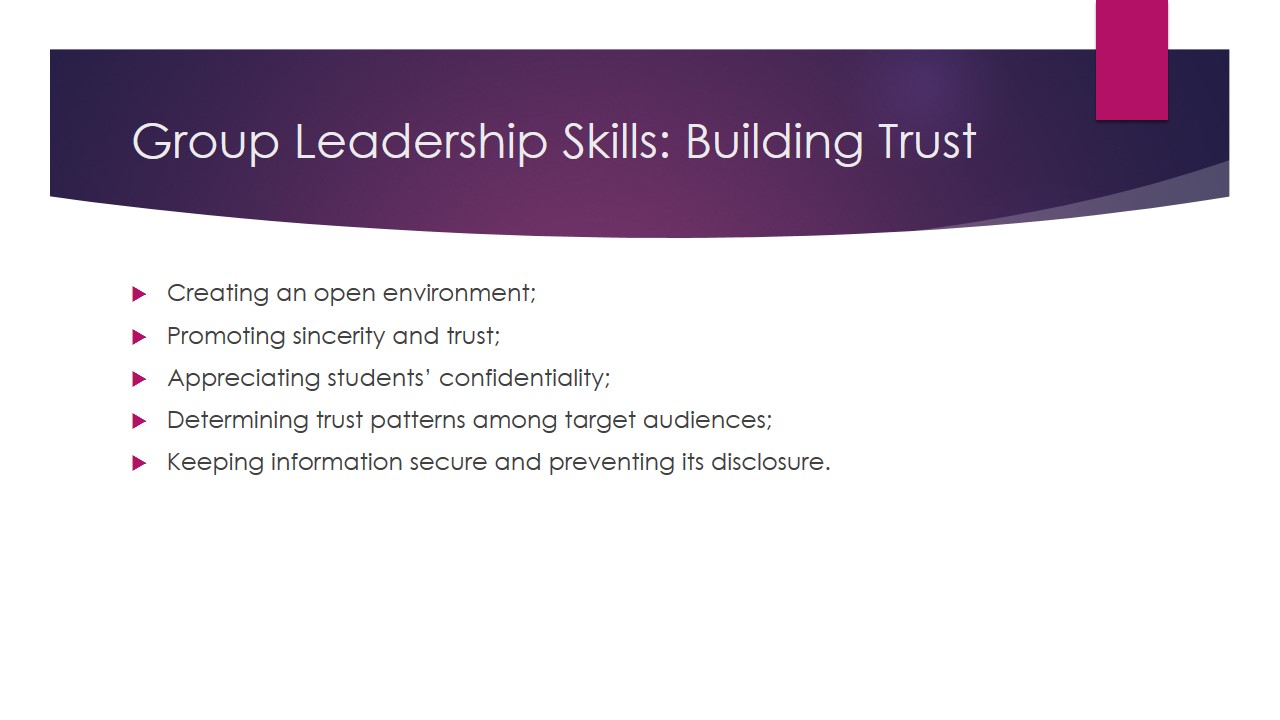
References
Corey, G. (2015). Theory and practice of group counseling (8th ed.). Boston, MA: Cengage Learning.
Jacobs, E., Schimmel, C. J., Masson, R. L. L., & Harvill, R. L. (Eds.). (2015). Group counseling: Strategies and skills (9th ed). Boston, MA: Cengage Learning.
Lassiter, P. S., & Culbreth, J. R. (2017). Theory and practice of addiction counseling. Thousand Oaks, CA: SAGE Publications.
Sharf, R. S. (2015). Theories of psychotherapy & counseling: Concepts and cases (6th ed.). Boston, MA: Cengage Learning.
Viers, D. (Ed.). (2017). The group therapist’s notebook: Homework, handouts, and activities for use in psychotherapy (2nd ed.). New York, NY: Routledge.